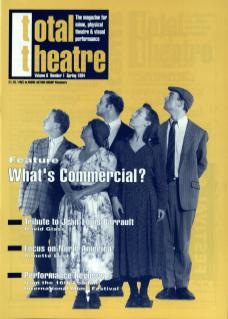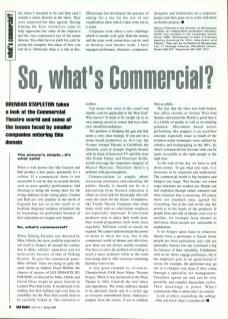The answer's simple...it's what sells!
When a well known duo like Cannon and Ball produce a new panto, potentially it's a sellout. If a commercial show is not successful it can be due to several factors, such as poor quality performance, bad directing, or being the wrong show for the wrong audience in the wrong place. Cannon and Ball are very popular in the north of England but not so in the south or in Scotland. Regional variation of humour can be frustrating for performers because of their aspirations to conquer new heights.
So, what's commercial?
When Talking Pictures was directed by Mike Alfreds, the show could be expected to sell itself to theatres all around the country due to Mike Alfreds' reputation and not necessarily because of that of Talking Pictures. So goes the commercial game. Mike Alfreds' fame not being in quite the same circles as Andrew Lloyd Webber, the chances of success of Les Enfants du Paradis, co-directed by Mike Alfreds and David Glass might be quite limited in London West End terms. It would need to be nothing less than brilliant and even then its suitability for the West End would need to be carefully looked at. The confusion is endless.
Can mime that tours in the small and middle scale be applicable to the West End? Who knows? It tends to be caught up in its own touring circuit in venues that have their own identified audiences.
The problem is bridging the gap and that needs a very clear strategy. If you put on a mime-based production in, let's say, the Yvonne Arnaud Theatre in Guildford, the clientele, used to straight English theatre with its share of borrowed TV and film stars like Frank Finlay and Penelope Keith would envisage the imprinted imagery of Marcel Marceau. Therefore there's a problem with preconceptions.
Commercialism is simply about increasing awareness and educating the public. Ideally it should not be in a patronising form, because education is where we must look for the people who will carry the torch for the future. Companies, like Trestle Theatre Company, who often make work with an educational emphasis are especially important. If television producers were to notice their worth more, they would programme such work more regularly. Millions could so easily be reached. We cannot underestimate the power of mime to show the way, but in the commercial world of theatre and television, new ideas are not always readily accepted. You have to solve the problem of needing to reach a mass audience while at the same time being able to offer everyone something that they want to see.
A very good example is, of course, Thunderbirds FAB from Mime Theatre Project. When it was premiered at the Place Theatre in 1984, it had all the vital values and ingredients. The mime audience tended to be educated, trendy and of a certain age so everyone remembered Gerry Anderson's puppets from the sixties, if not as children then as adults.
The fact that the show has both broken box office records at various West End theatres and toured the World is proof that it is a vehicle of quality as well as an amazing gimmick. Movement-based actors performing like puppets is an excellent concept, especially since so much of the isolation mime techniques were utilised by robotics and body-popping in the 80s. So what's commercial has become what can be made accessible to the right people at the right time.
At the end of the day we have to talk about money. To get what you want, it is necessary to be respected and understood. The commercial world is big business and budgets are large. War breaks out when wage structures are worked out. People can feel exploited through unfair contracts and what someone else is receiving. Of course there are standard rates agreed for everything, but at the end of the day the power is in the hands of the producer. If people from one side of theatre cross over to another, for example from theatre to television, those people are vulnerable to exploitation.
A lot hinges upon fame in whatever theatre form a performer is based. Some people are local pantomime stars and not nationally famous but can command a big fee because of their saleability. Exhibitions such as car shows engage performers, but if the employer goes to an agent based in circus, for example, the performer may go out at a cheaper rate than if they came through a speciality act management. Therefore agents are and can be very powerful, and complex hierarchies evolve. Their knowledge is power. What's commercial often is about who's in control.
Look at who's controlling the selling! ...Then you know what's commercial!

